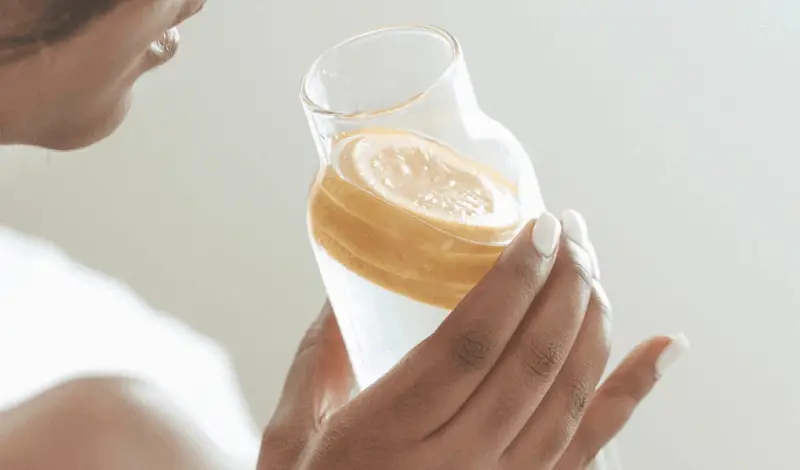Do you drink a lot of vitamin water? If like many modern women these days, you are looking to stay healthy and hydrated with on-the-go nutrition – then it’s likely that you have considered gulping down one or two vitamin waters. But is this actually good for your health in the long run? Let’s dive right into a frank review of whether or not Vitamin Water is actually beneficial. In this blog post, we’ll give an honest answer about the potential drawbacks as well as any positive results from drinking Vitamin Water so that you can make informed decisions about what beverages to include in your daily routine!
Can vitamins be absorbed with water?
Yes, vitamins can be absorbed with water. Water-soluble vitamins, such as the B-complex vitamins and Vitamin C, are readily absorbed into the body when ingested with water. The nutrients in these vitamins are released in the small intestine and quickly taken up by the body’s cells. Conversely, fat-soluble vitamins like Vitamin D, A, E, and K require a fat source for digestion, but once this is present they can also be absorbed by the body. However, due to their insolubility in water, they must first pass through the lymphatic system before being taken up by cells in the rest of the body.
What vitamins you can “drink” with water?
The main water-soluble vitamins are C, B1 (thiamin), B2 (riboflavin), B3 (niacin or niacinamide), B5 (pantothenic acid), B6 (pyridoxine or pyridoxal 5-phosphate), B7 (biotin) and B12 (cyanocobalamin). Vitamin C is a key nutrient that helps in the formation of collagen and the absorption of iron. It is also an antioxidant, protecting our body from oxidative stress. Thiamin helps to convert carbohydrates into energy, while riboflavin is important for growth, development, and cell functioning. Niacin aids in circulation and digestion. Pantothenic acid assists in the production of hormones, such as testosterone and adrenaline. Pyridoxine plays an important role in the metabolic pathways involved with amino acids and proteins, while biotin facilitates fat metabolism. Finally, cyanocobalamin participates in many metabolic processes related to DNA synthesis and neurological functions.
Can you drink vitamin water every day?
Yes, it is good to drink vitamin water on a daily basis. Vitamin water can help you get the vitamins and minerals your body needs to stay healthy and balanced.
Vitamins B1, B2, B3, B6, Folate, Vitamin C, and Biotin are all water-soluble and can be consumed every day to ensure that the body is receiving the necessary nutrients. While Vitamin B1 helps with energy production, Vitamin B2 helps with growth and development. Vitamin B3 aids in digestion and the conversion of food into energy while supporting healthy skin and nerves. Vitamin B6 supports hormone balance and helps to form red blood cells. Folate is involved in cellular replication for tissue growth and maintenance throughout the body. Vitamin C is an antioxidant that helps protect against cell damage from free radicals. Lastly, biotin plays a role in breaking down fats as well as aiding in creating glucose from carbohydrates.
When vitamin water bad for you?
Vitamin water can be bad for you if consumed in excess. Too much sugar and artificial sweeteners contained in some brands of vitamin water can have a negative impact on your health. Studies have shown that consuming sugary drinks like vitamin water on a regular basis is associated with weight gain and an increased risk of developing Type 2 Diabetes. Furthermore, some brands of vitamin water contain large amounts of sodium which can lead to higher blood pressure levels, putting you at risk for heart disease or stroke. Additionally, if you are pregnant, excessive consumption of vitamin water could increase your risk for gestational diabetes, as well as put your baby at a higher risk for birth defects. Lastly, certain brands of vitamin water contain caffeine, which can lead to insomnia and other sleep disturbances.
Related articles
It is therefore important to be mindful when consuming vitamin water and read labels carefully to ensure you are not exceeding recommended daily intakes. It is best to limit the intake of vitamin waters that are high in sugar and artificial sweeteners and opt instead for those that are low-calorie or calorie-free. Further, look out for sodium content as it can vary widely between different brands. While moderate consumption of vitamin water may provide nutritional benefits when combined with other healthy lifestyle choices such as a balanced diet and regular physical activity, it is important to recognize that too much can be harmful.
Is vitamin water good for you to lose weight?
Vitamins are important for many functions in the body, including metabolism and weight loss. B-complex vitamins, such as thiamine (B1), riboflavin (B2), niacin (B3), pantothenic acid (B5), pyridoxine (B6), cobalamin (B12) and biotin, can help boost metabolism and aid in weight loss. Vitamin D plays a role in fat burning and has also been linked to reduced body fat percentages. Lastly, Vitamin E may help reduce body fat by increasing the breakdown of fatty acids for energy production. The majority of mentioned vitamins are water-soluble, so, vitamin water will be helpful.
Is vitamin water good for you when sick?
Vitamin water is a popular choice for many people when they are sick, as it provides a source of an important ingredient for feeling better – vitamin C. Vitamin C is an essential nutrient that aids in the production of collagen and helps boost the immune system. It can also help reduce fatigue and improve alertness, so having a handy dose of vitamin C in your water bottle can benefit you when you’re feeling under the weather. However, while adding some vitamin C to your water may be beneficial, there are other considerations that should be taken into account before relying on vitamin water as your main source of hydration when sick. For instance, some types of vitamin water contain added sugars and artificial sweeteners which could potentially aggravate symptoms or make them worse. Additionally, if the type of vitamin water you choose contains electrolytes, they may not be balanced enough to provide adequate hydration and could potentially cause dehydration if consumed in large amounts. Therefore it is important to read labels carefully and do research on the best option when selecting a vitamin-infused drink for sickness.
Is vitamin water good for you while pregnant?
Vitamin water is generally considered safe to consume while pregnant, though it should be consumed in moderation. Look for a prenatal vitamin that contains calcium and vitamin D in addition to folic acid and iron. They aid in fostering the growth of the baby’s teeth and bones. Search for a prenatal vitamin that has vitamins C, A, E, and B vitamins, zinc, and iodine may also be advantageous. The vitamins and minerals found in many vitamin water drinks can help to provide some additional nutritional benefits and supplements during pregnancy, but they do not replace the need for a prenatal vitamin. Vitamin water may also contain added sugars that can contribute to extra calories, which you should try to limit during pregnancy. If you hesitate, consult with your doctor.
Conclusion
After considering all of the available evidence, it is clear that vitamin water can be beneficial in small doses. While it may provide some additional vitamins and minerals, it is recommended to read labels carefully and use no more than 1 or 2 servings a day. In addition, it is important to remember that vitamin water is not a substitute for whole foods–whole fruits and vegetables, as well as other nutritional sources, also provide essential vitamins and minerals needed for optimal health. Furthermore, many popular brands of vitamin water contain added sugar or syrup, making them less healthy options than just drinking a glass of regular water. Therefore, it is best to research the ingredients before drinking a lot of vitamin water. Ultimately, research are your vitamin water contains water-soluble vitamins before making an informed choice about including balance nutrition from other sources into your diet.











